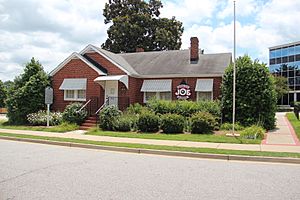Shoeless Joe Jackson Museum facts for kids
 |
|
 |
|
| Established | June 21, 2008 |
|---|---|
| Location | 356 Field Street, Greenville, South Carolina |
The "Shoeless" Joe Jackson Museum and Library is a special place that opened on June 21, 2008. It is located in Greenville, South Carolina, right across from Fluor Field. The museum is inside the five-room brick house where famous baseball player Shoeless Joe Jackson lived and passed away.
Inside, you can find some of Joe Jackson's personal items. There are also more than 2,000 books all about baseball. It's a great spot for anyone who loves the sport and its history.
Contents
About the Museum
The "Shoeless" Joe Jackson Museum and Library helps people learn about a legendary baseball player. It also shares the story of baseball itself. The museum is set up in Joe Jackson's actual home. This makes visiting feel like stepping back in time.
Who Was "Shoeless" Joe Jackson?
"Shoeless" Joe Jackson was a very talented baseball player. He played in the early 1900s. Many people thought he was one of the best hitters ever. However, he was later banned from playing baseball. This ban happened many years ago.
Trying to Get Back in the Game
In 2015, the museum asked Commissioner of Baseball Rob Manfred to let Joe Jackson be part of baseball again. They felt that Joe had been punished enough for what happened.
After looking into it, Commissioner Manfred said no to the request. He explained that it was too long ago, over 95 years, to be sure about everything that happened. He felt it was not possible to change the decision made so long ago.
Visiting the Museum and Grave
The museum welcomes visitors on Saturdays. If you want to visit during the week, you can arrange a private tour. It's a good way to learn about baseball history.
Many people who visit the museum also go to "Shoeless" Joe Jackson's grave. It is located in Woodlawn Memorial Park. This park is near the Bob Jones University campus. When people visit his grave, they often leave baseball items. These items include baseballs, gloves, and cleats. It's a way for fans to show their respect.
 | Audre Lorde |
 | John Berry Meachum |
 | Ferdinand Lee Barnett |

